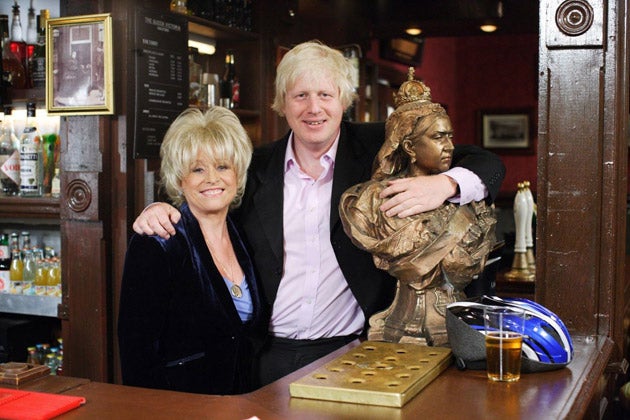Screenwriting masters: How to write for a soap
Creating stories and dialogue for TV shows (and mayors) is a real possibility if you take a course in screenwriting

Your support helps us to tell the story
From reproductive rights to climate change to Big Tech, The Independent is on the ground when the story is developing. Whether it's investigating the financials of Elon Musk's pro-Trump PAC or producing our latest documentary, 'The A Word', which shines a light on the American women fighting for reproductive rights, we know how important it is to parse out the facts from the messaging.
At such a critical moment in US history, we need reporters on the ground. Your donation allows us to keep sending journalists to speak to both sides of the story.
The Independent is trusted by Americans across the entire political spectrum. And unlike many other quality news outlets, we choose not to lock Americans out of our reporting and analysis with paywalls. We believe quality journalism should be available to everyone, paid for by those who can afford it.
Your support makes all the difference.Can you teach someone to write a good script? Or are good writers simply born with talent? The popularity of screenwriting courses and their rising numbers would suggest a lot of people are hoping it's a skill that can be taught.
At the London College of Communication, where course director Kelly Marshall runs a two-year, part-time MA in screenwriting, they believe in innate talent, but Marshall says there are definitely skills to learn too. "You can do it on your own without a course, but it's trial and error. Here it's guided, with a huge emphasis on physical writing and creating a large body of work. It's not just about hearing and speaking."
Students are put through a rigorous programme of at least four major script projects: for a short 10-minute film, a half-hour episode of an existing TV series, a half-hour adaptation of a short story, and a final piece of work that must be a film or major piece of TV. There are also options to pitch for commissions for joint projects with other institutions such as those teaching acting.
Marshall says the projects are designed to give a wide range of opportunity, and all work is seen by the class as well as tutors, to give students an idea of what it's like having work exposed to the public gaze.
It's worked for many – the list of film and TV awards and credits for past and present students is impressive. Graduates include the actor and playwright Kwame Kwei-Armah and TV and film writer Tracy Brabin.
The course has seen changes since Marshall, a graduate and practising writer herself, took over the directorship four years ago. Keen to invite in a cross-section of the population, she does not insist, as some screen-writing courses do, on entrants already possessing a degree. "I don't think a degree in history or fine art proves you can write," she says. "I'm keen to find an original voice even if a person has no education or degree – what's needed are people with something to say."
The result is that the course now has a mix of solicitors, single mums, builders, even a deep-sea diver. "We have a lot of life experience in the class," says Marshall.
Steven Kelly, who is in his final year of the Masters, had been working as a builder for four years. Having begun a sociology degree at Birkbeck College, London, and found it wasn't for him, he nevertheless felt compelled to keep writing while working, and finally signed up two years ago. The course has given him a basic tool kit, he says. "We have done a lot on structure, characterisation and dialogue, and it's also given me a good overview of the industry. I have written for the BBC – we were encouraged to put our work out in the public domain. But one of the best things was the workshops. Feedback can be really useful because working as a writer on your own can be lonely."
That's a point echoed by course graduate Jonathan Hall, whose script Fireworks, co-written with colleague Hannah Robinson, last year won him a $10,000 (£6,700) cash prize and a trip to meet Los Angeles producers. The first international winners of the annual American Screenwriters Association contest, he and Robinson now have UK and US agents and have sold the screen rights to the script.
"I had already begun writing for the BBC series Doctors when I started the course," he says. "I had done previous short courses but wanted to do an MA. It's great to have a writing group where you feel secure – we still keep one going. It's the style of feedback that counts."
Both writers admit that the going is tougher now as opportunities are cut back, but Hall is optimistic about chances in the US. "Studios which made big-budget films are struggling, but low- to medium-size concerns are not as badly affected, and investors do have money," he says. "Over here, it can be harder as you literally have to start from scratch."
Marshall's answer to the challenge posed by the difficulty in getting a launching pad for her students is to bring people to them. "It's one of those industries where it's not so much what you know but who you know," she says. "So we have a great collaboration with the industry, with students shadowing writers on popular dramas such as Hollyoaks, EastEnders and Holby City. Importantly, too, they are given time to meet agents and development executives. It is tough out there but we think we can give students a head start."
Join our commenting forum
Join thought-provoking conversations, follow other Independent readers and see their replies
Comments